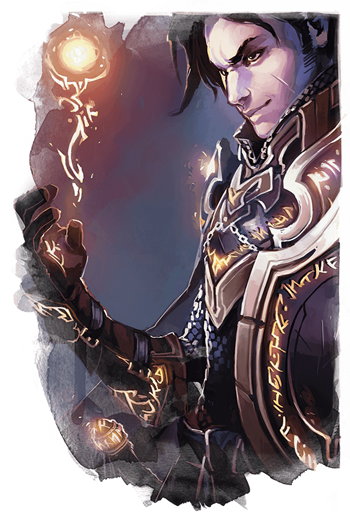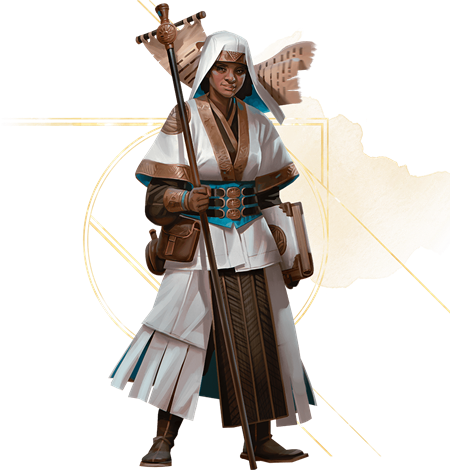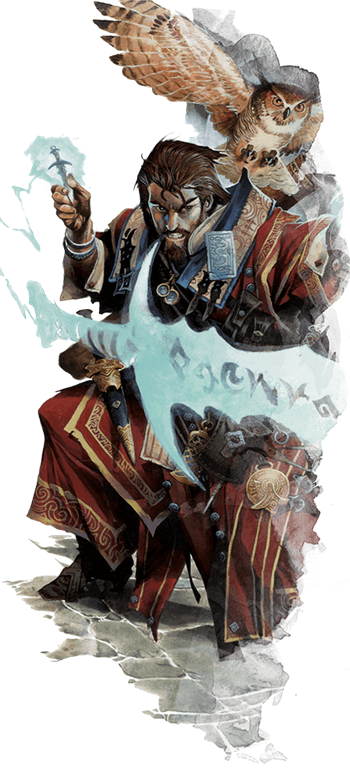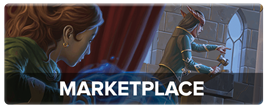
Few D&D adventures end without something magical happening. Whether helpful or harmful, magic appears frequently in the life of an adventurer, and it is the focus of chapters 10 and 11 [of the D&D Basic Rules].
In the worlds of Dungeons & Dragons, practitioners of magic are rare, set apart from the masses of people by their extraordinary talent. Common folk might see evidence of magic on a regular basis, but it’s usually minor—a fantastic monster, a visibly answered prayer, a wizard walking through the streets with an animated shield guardian as a bodyguard.
For adventurers, though, magic is key to their survival. Without the healing magic of clerics and paladins, adventurers would quickly succumb to their wounds. Without the uplifting magical support of bards and clerics, warriors might be overwhelmed by powerful foes. Without the sheer magical power and versatility of wizards and druids, every threat would be magnified tenfold.
Magic is also a favored tool of villains. Many adventures are driven by the machinations of spellcasters who are hellbent on using magic for some ill end. A cult leader seeks to awaken a god who slumbers beneath the sea, a hag kidnaps youths to magically drain them of their vigor, a mad wizard labors to invest an army of automatons with a facsimile of life, a dragon begins a mystical ritual to rise up as a god of destruction—these are just a few of the magical threats that adventurers might face. With magic of their own, in the form of spells and magic items, the adventurers might prevail!
—D&D Basic Rules, “The Wonders of Magic”
Faithful readers of this series on worldbuilding, how important is magic in your world? How does magic shape the day-to-day life of common folk, of adventurers, or of politically savvy faction leaders and nobility? How frequently will adventurers find magic items while they travel the world? Do the gods make themselves known daily through their clerics, or is the act of spellcasting itself a miracle? And has the world itself been molded by magic, as archdruids send treants to spread forests far and wide, and artificers warp the landscape through ill-advised experimentation?
If you already have a homebrew world you’re playing in, these are questions to reflect upon. Pull out your notebook or your digital campaign notes and write down answers to the questions you hadn’t considered. And if you’re creating a new world from scratch right now, these questions are vital ones to consider while making the foundation for your setting. If you build your stories and political structures too high without considering the basic foundation of magic, your entire setting can crumble when your players reach 5th level and higher, and start to come into incredible magical power themselves.
Also, check out the previous articles in our series on worldbuilding:
- Worldbuilding with Style and Subtlety
- Worldbuilding through Encounters
- Worldbuilding with Legendary Monsters
- Worldbuilding with your Players

How Common is Magic?
Magic is a cornerstone of D&D settings. Thanks to the prevalence of spells, magic items, and magical monsters, a D&D setting devoid of magic feels wrong, somehow. Magic is so foundational to the identity of D&D, that removing this cornerstone requires you to homebrew so much extra scaffolding to fill the gaps that you may as well have built your own RPG system from scratch—and there are a dozen great RPG systems out there that fill the high-fantasy, low-magic niche spectacularly, without requiring you to do all that homebrew legwork.
Because of that, we’re going to be taking D&D and its magical worlds at face value in this worldbuilding article. You can modulate the prevalence of magic a little bit—make magic so prevalent that it’s akin to technology, such as in Eberron, or make magic so dangerous that using it is an inherently evil act, like in Dark Sun. Most settings, however, fall into a middle ground where magic is part and parcel of the adventurer’s lifestyle, and of national and factional politics, but doesn’t affect the day-to-day of the common folk too much. In places like Wildemount and the Forgotten Realms, there’s no doubt that gods and magic are real and affect the world every day—but unless you’re an arcane scholar or an adventurer who battles monsters for a living, there are good odds your only exposure to magic is when a Gandalf-esque traveling hedge mage comes to town once or twice a year to perform some tricks of prestidigitation.
I encourage you, if you wish to create a world where magic is as rare and miraculous as it is in real-world folk tales, or low-magic fantasy stories, to either seek out another system—or, prepare for the consequences of your party being essentially superheroes. I think the idea of being magical fantasy superheroes is a thrilling concept for a campaign; you are people whose powers have grown so far beyond mortal comprehension that you are utterly unrelatable to the common folk. You are like demigods divorced from your humanity at all but the most fundamental level, and must grapple with the psychological and moral ramifications of that.
That’s a wonderful conceit—but it’s a dominating flavor to cast unwittingly into your worldbuilding stewpot. Please deviate from the norms of D&D however you wish, but do so with caution.
Magic as an Institution
 Lots of fantasy settings have organizations that deal in magic and relics as commonly as trade guilds deal in merchandise and gold. These may be institutions of learning, such as Blackstaff Tower in Waterdeep, or the Soltryce Academy in Rexxentrum. Or they could be instruments of political power, in which mages gather to protect the order and stability of a nation, like the Cereberus Assembly of the Dwendalian Empire—or, simply an order of magi who wish to enrich themselves with untold magical power from ages long past, like the Arcane Brotherhood in Luskan.
Lots of fantasy settings have organizations that deal in magic and relics as commonly as trade guilds deal in merchandise and gold. These may be institutions of learning, such as Blackstaff Tower in Waterdeep, or the Soltryce Academy in Rexxentrum. Or they could be instruments of political power, in which mages gather to protect the order and stability of a nation, like the Cereberus Assembly of the Dwendalian Empire—or, simply an order of magi who wish to enrich themselves with untold magical power from ages long past, like the Arcane Brotherhood in Luskan.
This seems like a rather logical way for things to play out in a setting where magic is a known quantity, and its use isn’t demonized. In settings where magic is rarer than usual, or perhaps it is misunderstood as devilry, magic-users are wont to be more reclusive, teaching their ways in secret. Settings like this give rise to hermit-like wizards who create towers in distant wastelands, so that they can practice their cosmic powers away from limited minds. Do magic-users in your setting gather in cities? Or in the wilderness?
Reclusiveness of this nature can also be born from settings where magic is common, but there are certain magical norms in place. Necromancy is a perfect example of a socially deviant sort of magic “standard” D&D, because turning the dead into mindless automata is seen as a deeply evil act—and so necromancers often practice their art in secret to avoid persecution. I think enchantment is a great choice for DMs who want to create a less stereotypical sort of taboo magic. Literally twisting the minds of the masses to your will, blurring the lines between consent and coercion—it’s easy to see how a people would rise up against enchanters! Are magic-users in your setting wielding dark power? Or are they misunderstood? Or, could the issue be more complicated than simple “good” and “evil?”
On the other hand, you could make certain schools of magic wrongly demonized for social reasons, much in the way that many marginalized people are wrongly treated as deviants or as second-class citizens in real life. Likewise, certain magical factions could be misunderstood—either because of that faction’s own intentional duplicity, or because the common folk misunderstand and fear them, or because the powers that be want to discredit an institution that could pose a threat to their rule. Are magic-users in your setting allies of nations? Or are they enemies? Do they want social power? Or do they already have all the power they need?
Magic of the Gods
 Gods are a complex subject—complex enough for their own separate worldbuilding article! Nevertheless, it’s worth bringing them up in the context of how magic affects your worldbuilding, namely because of divine magic’s role in healing. Healing isn’t all clerics can do, nor is healing exclusively the domain of clerics, but the role of the healer cleric is an iconic one that deserves special recognition.
Gods are a complex subject—complex enough for their own separate worldbuilding article! Nevertheless, it’s worth bringing them up in the context of how magic affects your worldbuilding, namely because of divine magic’s role in healing. Healing isn’t all clerics can do, nor is healing exclusively the domain of clerics, but the role of the healer cleric is an iconic one that deserves special recognition.
If healing magic is commonly associated with the gods, then it stands to reason that public health is the domain of religious institutions in your setting. This isn’t a particularly ahistorical fact, either. Many early hospitals and sanatoriums were church-sponsored in Europe, so it makes sense for a European-inspired fantasy setting to mimic this. (Though, if your setting isn’t European-inspired, then you may want to consider how you can de-link healing and the gods so that you don’t accidentally emulate this archetype.)
How many members of the clergy are clerics, like the class? How many clergy are people of faith, but lack the magical powers that clerics possess? Does every little village in your setting have a church led by a priest, or even a lesser acolyte (both stat blocks with access to miraculous magic). If not, then how far would the average person have to travel in order to see a cleric to have diseases cured or bones mended? Would it cost them an arm and a leg?
Likewise, if churches have literal miracle-workers at their beck and call, are they a political force unto themselves? Does the church, much like they did in Medieval Europe, have power greater than any nation, thanks to the power of their holy knights and inquisitors? If a monarch is unfaithful to the church, what would happen? Would assassins arrive in the royal palace, their pockets filled with gold drawn from the tithing box? Would civil war erupt?
As said above, this topic is deserving of its own article, but the intersection of magic, religion, and political power is a potent tool for you to use in your own worldbuilding. Studying real-world history and theorizing what would happen if you to add literal divine magic to the mix is a great place to start building any fantasy setting.
Magic Items as Relics or as Tools
Unless you decide your campaign works otherwise, most magic items are so rare that they aren’t available for purchase. Common items, such as a potion of healing, can be procured from an alchemist, herbalist, or spellcaster. Doing so is rarely as simple as walking into a shop and selecting an item from a shelf. The seller might ask for a service, rather than coin.
In a large city with an academy of magic or a major temple, buying and selling magic items might be possible, at your discretion. If your world includes a large number of adventurers engaged in retrieving ancient magic items, trade in these items might be more common. Even so, it’s likely to remain similar to the market for fine art in the real world, with invitation-only auctions and a tendency to attract thieves.
 The Dungeon Master’s Guide tells us that the standard assumption for a D&D setting is that magic items are masterwork relics of a bygone age, like a long-lost Picasso portrait that can also shoot fire out of its eyes three times per day. This is a suitable worldbuilding assumption for this edition of D&D, where magic items are always gravy on top of the impressive suite of destructive powers that player characters gain over the course of their adventuring careers.
The Dungeon Master’s Guide tells us that the standard assumption for a D&D setting is that magic items are masterwork relics of a bygone age, like a long-lost Picasso portrait that can also shoot fire out of its eyes three times per day. This is a suitable worldbuilding assumption for this edition of D&D, where magic items are always gravy on top of the impressive suite of destructive powers that player characters gain over the course of their adventuring careers.
But this is not the way D&D has always worked. In previous editions of the game, gaining new magic items were part and parcel of a character’s power progression. The balance of the game assumed that you had a specific number of magic items at every level of the game—as opposed to now, where it assumes you have none, and lets the Dungeon Master increase the power of encounters ad hoc to suit your advanced power if you do have them.
The availability of magic items is a point where the mechanics of D&D and the stories you can tell in D&D are invariably intertwined. Settings like Eberron, where artificers create miraculous arcane inventions and everyone in Sharn has a feather token on hand in case of an accident, are wildly different from settings like the Forgotten Realms, where even a bag of holding is a miraculous artifact from an age long passed. Decisions you make about the power level of your game will affect your world, and vice-versa.
If you want to make magic items rare, like in the Forgotten Realms, then you can add depth and flavor to your world’s magical artifacts by thinking about where they came from. What ancient, warlike empire did the vast majority of magical weapons hail from? What kind of ruins can they be found in? What aesthetic trappings do magic items from different ancient cultures have? Ask these sorts of questions for all types of items; maybe another civilization was focused on pure arcane power, rather than melding magic and weaponry, and so focused on creating things like staves and wands. Asking these sorts of questions will let even your treasure rewards serve as important worldbuilding tools.
If you want to make magic items common, like in Eberron, then the above advice still applies—who’s the Apple or Microsoft of your world’s magic item industry? Who makes weapons for the military? But there are also other questions you can ask that inform your ideas of class and political power within your setting. Back in the ‘70s, it was basically impossible for anyone but the government or the extremely wealthy to own a computer. Now, everyone has a personal computer more sophisticated than the machine that took a man to the moon in their pocket. In a setting where magic items are analogous to technology, who does that technology help? Who has access to it? Who’s using it to do good? Who’s abusing it?
Have you ever thought about magic in your setting? What sets your world apart from others? Let us know in the comments below!
Create A Brand-New Adventurer Acquire New Powers and Adventures Browse All Your D&D Content
 James Haeck is the lead writer for D&D Beyond, the co-author of Waterdeep: Dragon Heist, Baldur's Gate: Descent into Avernus, and the Critical Role Explorer's Guide to Wildemount, a member of the Guild Adepts, and a freelance writer for Wizards of the Coast, the D&D Adventurers League, and other RPG companies. He lives in Seattle, Washington with his fiancée Hannah and their animal companions Mei and Marzipan. You can find him wasting time on Twitter at @jamesjhaeck.
James Haeck is the lead writer for D&D Beyond, the co-author of Waterdeep: Dragon Heist, Baldur's Gate: Descent into Avernus, and the Critical Role Explorer's Guide to Wildemount, a member of the Guild Adepts, and a freelance writer for Wizards of the Coast, the D&D Adventurers League, and other RPG companies. He lives in Seattle, Washington with his fiancée Hannah and their animal companions Mei and Marzipan. You can find him wasting time on Twitter at @jamesjhaeck.











-
View User Profile
-
Send Message
Posted Jul 17, 2020That is very interesting!
I also liked James's suggestion that enchantment spells could be banned, and for good reason. Messing with someone else's free will is messy business, and if you imagine it in the real world, it's easy to see why people would have issues with anyone using that sort of magic.
-
View User Profile
-
Send Message
Posted Jul 17, 2020Agreed. The way the school of enchantment can be abused is best portrayed by the Purple Man from the Marvel show Jessica Jones. The way he figuratively and literally rapes people, then throws them away to deal with the fallout, is the level of callousness you can only achieve by seeing people as disposable dolls to do as you command. I can see how a narcissist and psychopath would be drawn to enchantment. David Tennant really did a great job in bringing that to life.
Even the less invasive spells in enchantment might not pass morally or legally. Zone of truth in a court of law could be argued to be forcing someone to testify against themselves. Calm emotions can be seen like forcibly drugging someone with Xanax. Antipathy/sympathy could be used in some really nasty racially motivated attacks, or to enforce fantasy redlining.
-
View User Profile
-
Send Message
Posted Jul 17, 2020(The link to Worldbuilding with Legendary Monsters is pointed wrong)
-
View User Profile
-
Send Message
Posted Jul 17, 2020Gee, dnd politics. how great.
-
View User Profile
-
Send Message
Posted Jul 17, 2020Hey BramblefootDruid,
i'm also starting a Runeterra-based homebrew campaign soon.
In which area did your players start? I had thought of a little tutorial that takes place in the middle part of Valoran and that they will come to the other regions later.
Also, do you have a story or encounter that you can share and that your players really liked?
regards
Vik
-
View User Profile
-
Send Message
Posted Jul 17, 2020I started it in Bilgewater ( I started before dark tides of Bilgewater), and now they have moved onto Ionia. My players really liked an encounter in Ionia with some saytrs, who were having a huge feast in a clearing on the woods. They are all very happy, and if disturbed, they will ask for a race. Then roll initiative (I made it 150 ft, straight line). NPC's: assyndra , female. Very kind, slightly flirtatious. VERY beautiful. Karick: male, arrogant, handsome, says he's the best (if assyndra wins, she flirts with the winner if they are a boy). Hope yours goes well!
-
View User Profile
-
Send Message
Posted Jul 17, 2020I'm playing around with the idea that magic is so common, any class has the ability to gain spell slots. They would be required to pray/meditate for a week at specific locations depending on the school of magic and complete some sort of trial. They'll be rewarded with either a cantrip or maybe a level 1 spell slot for 1 month.
-
View User Profile
-
Send Message
Posted Jul 17, 2020Exactly. This article and your comments have given me things to think about in terms of the legal aspects of magic in an area of the world that the party in my campaign may visit soon. This particular area has a relatively high availability of magic, so it only makes sense that there'd be significant regulations on it.
-
View User Profile
-
Send Message
Posted Jul 19, 2020Very thoughtful article.
Over the many years I've set campaigns in many realms with different magic rules. I have found that logically if magic is truly available to those who learn it (Magic Users), those who just innately HAVE it (Sorcerers), and those pray for it (Clerics)... not to mention the many builds in 5e that fling it around willy nilly (Arcane Trickster) it's going to be everywhere. Cantrips are available to 17 year olds who can be eaten by a wolf if they get lost in the woods. IF that's so, it's silly to suggest that it would be rare... or even "uncommon". Therefore we should embrace it as a commodity available to most folk. Just like mundane folks in our real world might take a night class and learn a skill like welding, regular fantasy folk would have basic magic available all around them. It's just bloody human(oid) nature.
If we limit magic, including the idea of magic shops, spells for hire, etc, we also should limit the availability of magic to the player... a believable premise is the outlawing of magic or the control of magic users by a privileged class. But in the end keeping a magically believable world alive is the greatest challenge of a Dungeon Master. We can't very well have everyone circumvent every plot line with a Wish spell of course... but certain natural consequences of a magical world cannot be avoided without asking a lot from our players. It's not THAT hard to make a magic potion... if you could do it like the game describes, wouldn't you SELL it just like any artisan sells their hard earned skills?
-
View User Profile
-
Send Message
Posted Jul 20, 2020As somebody who's hoping to run a Necromancy Themed thing, this had a lot of nice ideas to run with.
-
View User Profile
-
Send Message
Posted Jul 21, 2020Conceit has several meanings and I’m pretty sure it works in that sentence.
-
View User Profile
-
Send Message
Posted Jul 23, 2020I really like enchantment as a forbidden magic. At least necromancy only messes with you once your dead!
-
View User Profile
-
Send Message
Posted Jul 23, 2020yeah me to
-
View User Profile
-
Send Message
Posted Jul 23, 2020Excellent article! You raised many good points, although there is something that has been left unsaid for quite a while it might be useful to touch on.
You point out that in settings where magic is rare, it is often very old and remnants of previous civilizations. But what if you're playing the equivalent of a bronze age campaign? What if magic is rare simply because it is so new and nobody has had time to mass-produce anything? In that situation, there are no best standards and practices. There is no traditional way of doing magic because the people of the current era are the ones building the traditions. So the question then becomes "what does it take to make magic, and to make it to stick around attached to an item?"
The answer to that will almost always very from campaign to campaign and setting to setting. Every DM has their own opinions on it. I'm reminded of an old joke but I remember being in a forgotten realms novel. "Ask any 10 wizards what magic really is, and you will get at least 12 answers." But these are things with dungeon Master's need to considernot just if they are playing a primitive campaign, but also in a more established campaign. Why are certain magical items almost always made a certain way? Is it possible to make them differently, was it just a stylistic choice by the people of the time in which they were created, or is there something about the item itself that precludes significant variation? Why do all flaming swords have a special twist to the handle that makes them easier to wield in the left hand than the right? Why do all the amulets of protection from evil it can be traced back to the third dynasty smell like lavender? Why does every cloak of elvenkind found in the ruins of Myth Dranor have a complicated system of stitching in their hems that spells out the phrase "Dwarves smell like feet" when closely examined ina mirror?
-
View User Profile
-
Send Message
Posted Jul 24, 2020This was very interesting
-
View User Profile
-
Send Message
Posted Jul 24, 2020The person who commented named Me_Link gave me an idea. I’m going to make a breath of the wild world
-
View User Profile
-
Send Message
Posted Jul 25, 2020I am currently running a campaign based off of breath of the wild, in a breath of the wild world, where the characters are the champions 10,000 years after the events of breath of the wild. then the gerudo champion betrayed them and turned out to be ganondorf.
@Xanatharjr
-
View User Profile
-
Send Message
Posted Jul 25, 2020The Alex Verus novel series is a good place to learn about the effect of magic on society and how magic items work. It is set in modern england but is easy to lift out and put into other setting.
-
View User Profile
-
Send Message
Posted Jul 28, 2020In worlds like the Forgotten Realms how is it that some large scale rulers aren't mages, it seams that being able to cast wish is far better than swinging a sword, and a court mage is likely to rebel and take over.
-
View User Profile
-
Send Message
Posted Jul 29, 2020I've thought over the same question myself. There are two things that could prevent or reduce the frequency of that happening. One could be that powerful mages are very rare, so even a whole country may not have a level 18 or 20 wizard. The second is to consider hit points. If you get a wizard surrounded by an army of even low CR enemies, he or she can't beat them all without eventually running out of hit points. That's not to say there wouldn't be some mages who did take over countries, but there would be obstacles and there may still be regular kings and queens. Of course, a world (or region) where mages were the rulers is also entirely possible.